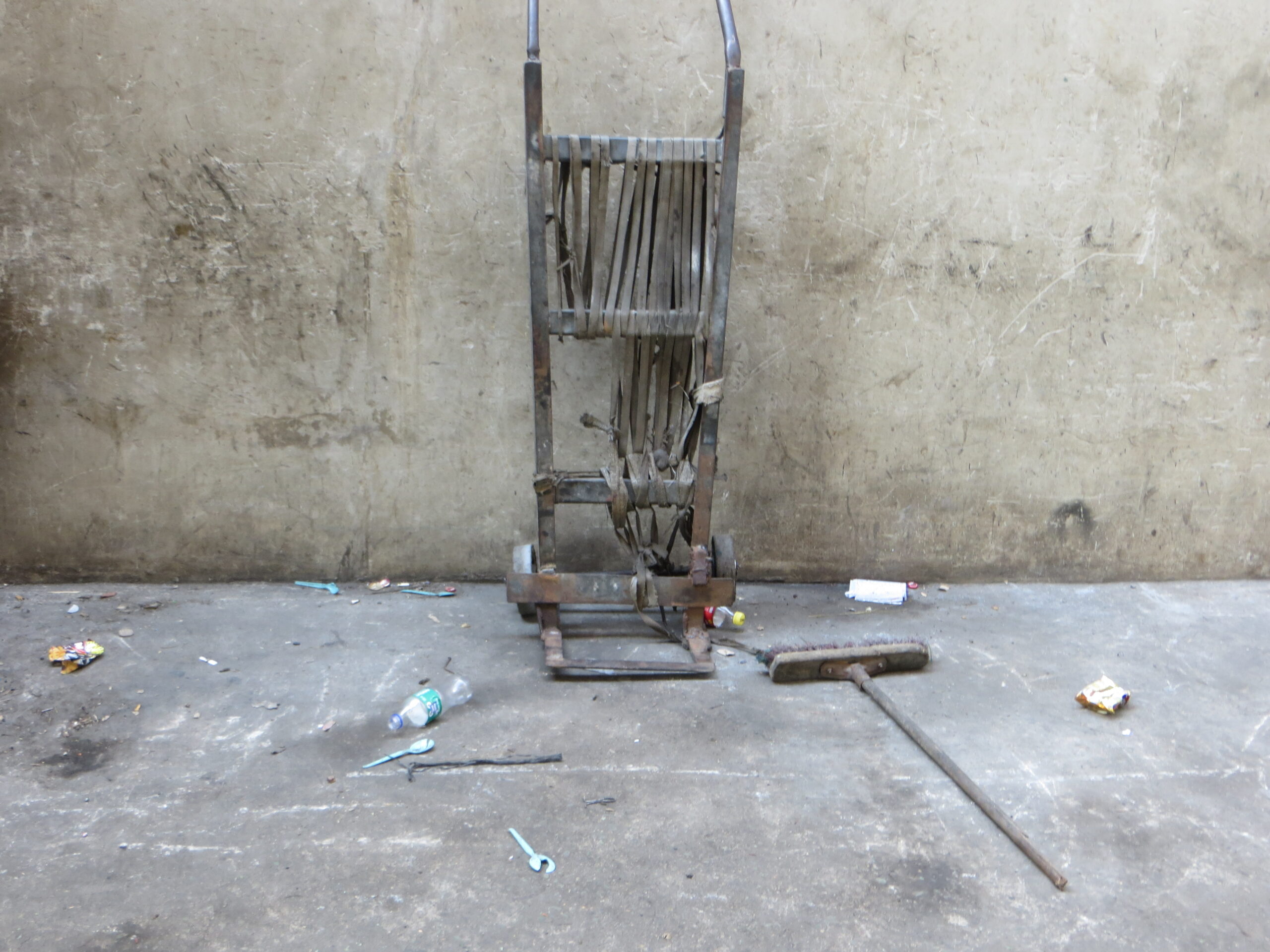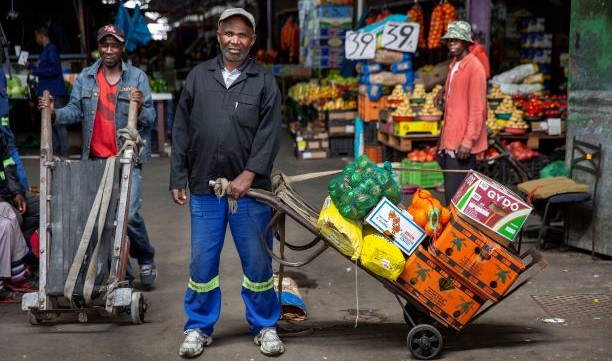Sarah Heneck & Toni Ottanelli-Gale
Have you ever wondered where street vendors store their goods at night, how these goods are moved and replenished? Have you seen several crate trolleys idling on the pavement of the inner-city or men pulling crate trolleys through the traffic, laden with various goods? Behind the scenes, hustling through the inner-city of Durban from as early as 3am until as late as 10pm, there is a large group of men that form the underbelly of the inner-city economy, equipped with a non-motorised conveyance and their brute strength. These are the Os’gadla (isiZulu for “transporters of goods”).
Os’gadla are the barrow operators or trolley pullers, a sector of the informal economy that rely on non-motorised transport (NMT) to support their livelihoods. There are many other informal workers who rely on NMT, such as water carriers, informal recyclers (waste pickers) and itinerant street traders. The integral role of these informal workers is generally unnoticed and yet they offer effective, efficient and necessary services that support the inner-city economy.
Barrow operators transport everything from supplies (food, merchandise, building supplies etc.) to entire trading stalls using crate/ sack trolleys. With over 21,000 informal traders operating in public spaces in Durban’s inner-city, many secure the services of barrow operators to move their entire trading stalls to and from storage each day. There are an estimated 800-1000 barrow operators operating in Warwick Junction alone, who move approximately 100 tonnes of goods around the city daily.
A typical trolley used by barrow operators. Photo: Richard Dobson.
Where there is limited access to a water source, water carriers supply large containers of water using carts or trolleys. In Warwick Junction there are an estimated 50-80 people carting and selling water, for example; to informal traders’ for cooking and cleaning, and to taxi ranks for an estimated 2,000 minibus taxi’s to be washed daily.
Informal recyclers, who recycle cardboard (amongst other recyclable materials), are the main recyclers around the city of Durban, salvaging an estimated 150 tons of cardboard a day. An estimated 500 informal recyclers operate in Durban’s inner-city alone, some of whom use dolly carts or trolleys to collect and transport recyclable materials so that they can be sold to middle agents who deliver the material to recycling companies.
Itinerant traders sell goods from adapted shopping trolleys or even makeshift vending carts. Hundreds of these traders’ move between the various hotspots within the inner-city selling anything from mealies (corn-on-the-cob), fruit, snacks to accessories and cosmetics.
Their activities predominately take place in public roads, sidewalks, and alleyways. However, it is not legal to use the streets for these forms of NMT, and there is often friction with vehicles –creating a life-threatening and stressful working environment. This stress is heightened when in some cases their activity on the public roads has resulted in harassment, ticketing, and confiscation of their trolleys (and the goods they are transporting) by local enforcement. Further, the ‘abandoned goods’ bylaw is an example of the municipality’s reactionary and regulatory-biased response to informal workers, which reflects their lack of awareness of informal workers’ challenging working environments and their inability to consult informal workers. Each day street vendors’ pack up their entire trading stall into storage boxes and barrow operators move their goods to and from storage. Delivering these goods in the early hours of the morning is preferred as the roads are quieter (and safer) for the barrow operators to utilise. Roads are the most efficient route because often sidewalks are inaccessible, full of potholes or tree rings. If goods are transported later in the morning, the barrow operators may be subjected to fines for obstructing the traffic. Therefore, the goods are left on the sidewalks unattended until street traders arrive to setup. The municipality didn’t approve of this and responded by implementing the ‘abandoned goods’ bylaw which gives local enforcement the authority to remove and impound goods if left unattended for a period of time.
Despite the barrow operators’ logical approach in performing their work, the informal recyclers being the most efficient sector with regard to salvaging recyclable materials and the water carriers providing a water source which would otherwise not be available – the municipality doesn’t recognise their integral role in the inner-city and has not created opportunities to integrate their activity into urban plans. This has resulted in challenging working circumstances and insecurity of livelihoods – and by extension inserts risk in the value chains of the customers they work with. An article about informal recyclers in South Africa mentions that “the job may look rudimentary, or even quaint, in this technology-driven world. But that is the reclaimers’ core ethos — where many see a collector pushing a handmade cart, they see a carbon-free vehicle. And where most people see trash, they see opportunity, and a chance to make their world a little cleaner.”
There is an opportunity to change the way the work of the Os’gadla is seen. Instead of being perceived as obtrusive and dysfunctional, rather recognise their value in the city through inclusive planning and design which would recognise and dignify their livelihoods. The potential to capture the latent energy and proactively integrate these urban practices into the City’s plans will be explored in the blog to follow.
[Feature image: Barrow operator at the Early Morning Market, Warwick Junction. Photo: Dennis Gilbert (2019)]
(Read Part 2: Inclusive urban design and policy that dignifies the Os’gadla)
















